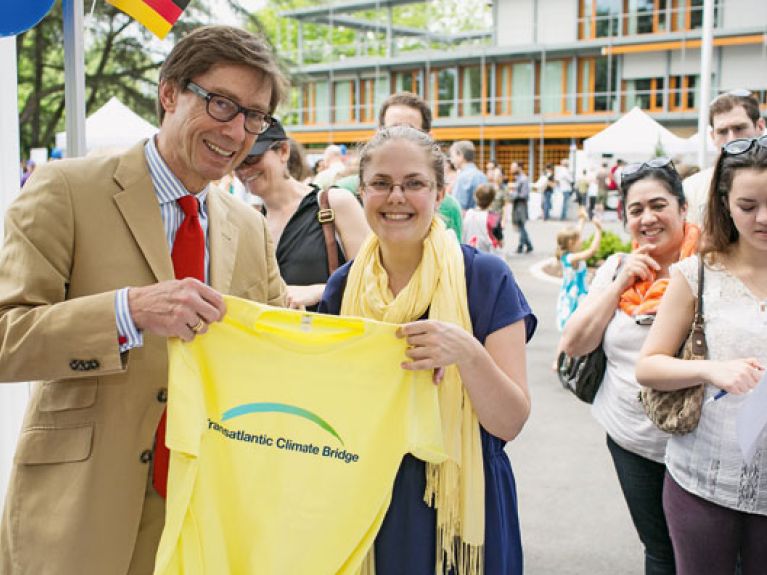Political impetus for change
The Transatlantic Climate Bridge champions climate protection and environmentally friendly energies.

It is indeed a particular accolade: “What Germany has done is really like a postcard from the future for us in Minnesota,” we hear in the film Integrated Energy Solutions. It is about environmentally friendly energy, and the half-hour documentary reveals how the US state is planning to realign itself and what it can learn from Germany in the process. The Public Broadcasting Service (PBS) aired the production, which was so well received that in fall 2015 it was nominated for a regional Emmy Award. The Emmys are TV’s Oscars.
The film would probably never have been made were it not for the Transatlantic Climate Bridge. It is the result of years of exchange between energy experts from Minnesota and Germany, which the initiative promotes. In summer 2015 the Americans spent a week looking at energy-saving structures in Hamburg, North Rhine-Westphalia, and Berlin, inspecting sustainable commercial zones, and discussing the energy transition, the switch to renewable energies. Among them there were five representatives of the state government, influential heads of authorities and representatives of energy companies, plus academics from the University of Minnesota, who put the documentary together.
The Transatlantic Climate Bridge is now nine years old. The project platform was initiated by Frank-Walter Steinmeier during his first term as Federal Foreign Minister, and by Sigmar Gabriel, the then Federal Minister for the Environment and now Deputy Chancellor and Federal Minister for Economic Affairs and Energy. Through events and activities the Climate Bridge has since done much to improve understanding between Americans and Germans in energy and climate policy.
It is patient, long-term work with lay people and experts, which even without spectacular success stories achieves a lot, in particular in terms of atmosphere. “We choose topics that are the subject of discussion on both sides of the Atlantic, not just topics like renewable energies, in which Germany has a certain leading edge,” says Georg Maue, who is responsible for activities on various subjects as First Secretary Energy and Climate at the German Embassy in Washington. They include, for example, energy saving and the Smart Grid, as well as the intelligent networking of electricity generation, storage, and consumption.
In the early days of the Climate Bridge the Americans were primarily interested in information about the German energy transition. Later, even before the 2015 United Nations Climate Change Conference in Paris, the focus moved to cutting CO2 emissions. The Climate Bridge supported, for example, artists who drew attention to climate change by means of creative street actions, as well as a series of events staged by the think tank Center for American Progress, which looked at the impact of climate change on food supply. And when, ahead of the Paris climate summit, international industrial regions signed a Memorandum of Understanding on climate protection, both California and Minnesota were among them – the latter not least thanks to its longstanding transatlantic experiences.
It has long been nothing more than a cliché that the global superpower USA is indifferent to environmental issues. “The USA has moved on from obstructing international climate protection to being one of the main driving forces behind it,” says Georg Maue. That was already emerging in June 2013, when President Barack Obama presented his Climate Action Plan. It marked the beginning of political rethinking in Washington, “in diplomatic circles contacts suddenly began adopting a far more open-minded approach to the subject,” Maue recalls. A year later the President came to an understanding with China – an important prerequisite for success in Paris. It is now about actually implementing the target of keeping global warming clearly below two degrees. The Climate Bridge also intends playing a role in that. In summer 2016 it is financing a lecture tour by the political scientist and energy transition expert Arne Jungjohann on the East Coast of the USA.
Although, thanks to new sourcing techniques (fracking), gas and oil are now cheaper in America than they have been for decades, the market for renewable energies is nonetheless booming – among other reasons because many US states, first and foremost California, have set ambitious quotas for wind power and solar power. And several subsidiaries of German companies are playing their part in satisfying the growing demand: Siemens produces wind turbines in Fort Madison, Iowa, Eon operates wind farms in Texas and is a partner in the 18-megawatt solar power station Fort Huachuca in Arizona. And in February 2016 the insurance company Allianz announced a 200-million-euro investment in two wind farms in New Mexico – its first investment in renewable energies outside Europe.
And what is going to happen to climate policy in the USA after the presidential election? Georg Maue is convinced that “If the Democrats win, it will be continued just as rigorously as under Obama.” Making a prediction of what will happen in the event of the Republicans coming to power is more difficult, since their candidates seem to be largely ignoring the topic in the election campaign. Maue is encouraged by the growing economic importance of renewable energies – conservatives do not normally go against the market. ▪
HONOR FOR US PHYSICIST LOVINS
In mid-March 2016 international experts and decision-makers once again convened in the Federal Foreign Office for the Berlin Energy Transition Dialogue to exchange opinions and ideas about the possibility of a global energy reform. Speakers at the conference included Federal Foreign Minister Frank-Walter Steinmeier and Fatih Birol, Executive Director of the International Energy Agency (IEA). At the conference the physicist and environmental activist Amory B. Lovins, head of the Rocky Mountain Institute, was awarded the Federal Cross of Merit First Class, the highest honor the Federal Republic of Germany bestows, in recognition of his services for the public good.

